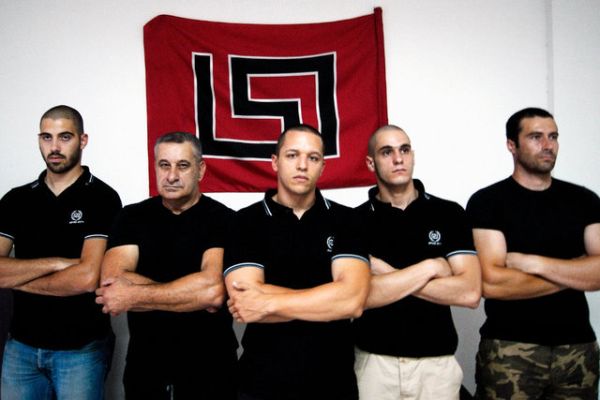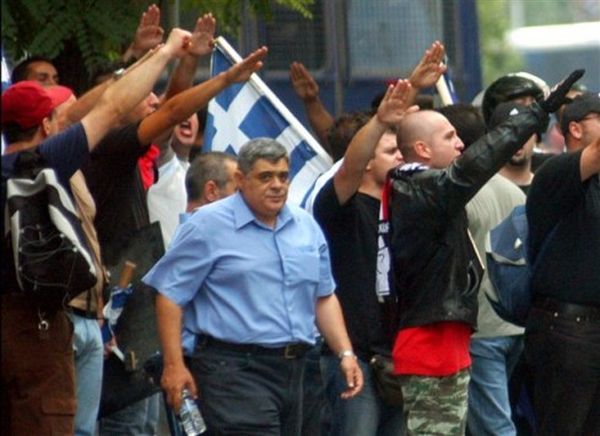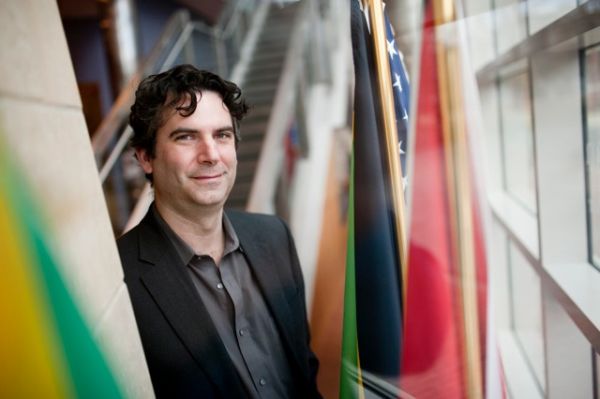Photo: To Vima newspaper, Russian far-right members demonstrate in Moscow using the Nazi salute
Recently, a folk song from the time of Ottoman rule praising the power of Moscow has been brought back to life among politicians, businessmen, shipping magnates and university teachers. The expectation of support from Russia, which still fascinates many Greeks, has supporters in nationalist, conservative and patriotic circles that perceive the Kremlin as a defender of the country.
There has recently been a stir in society related to the video posted on the Russian platform rutube.ru, which reveals a conversation between former Secretary General of the Cabinet Panagiotis Baltakos and Ilias Kasidiaris from Golden Dawn. It has raised many questions, one of them being why was the early morning of 2 April preferred for posting the video by an unknown user called "account 601126"? According to well-informed sources, this was because it would not be easy for the Greek police or any Western Service to intervene nor to trace the person who had posted the video.

Golden Dawn, Ilias Kasidiaris in the centre, Photo: aksioprepeiakantoxh.com
"Selective preferences"
All who are very well aware of the actions behind the scenes speak about "selective preferences" for the Greek Golden Dawn on the part of Russian private and even state media, business, political and church circles, and various non-governmental organizations. No one can say with certainty that Russian circles want to strengthen the positions of Golden Dawn but there are many signs that confirm such a version.
According to sources from the government, the recent posts supporting specific Russian business and political circles that have ties with the powerful church there have not appeared by accident in Russia.
"You should have no illusions. Take a general look at the facts and signs", a source who is aware of the business and geopolitical game in the region emphasizes before "To Vima" newspaper.
“Russian fascists, extreme nationalists and those who are nostalgic for the monarchy, with whom the party of Nikolaos Michaloliakos has close links, have not become fond of Golden Dawn all at once. However, the interest on the part of the political and business circles is sudden. They believe that they can benefit from a strong Golden Dawn and therefore want it to have a strong presence in the political life of Greece", continues the same source and, to avoid any misunderstandings, hastens to point out that the support for Golden Dawn is not a central policy of the Kremlin.
"There are no instructions from Putin but those who have established relations with Golden Dawners are close to the centre and have access to the central government in the Kremlin", states a Greek politician who is familiar with the activities of the extreme right wing. In any case, although Putin has not given his "blessing" to what is happening, the fact that even Russian state media have presented the activities of Golden Dawn gives rise to multiple scenarios.
Interview with Michaloliakos
A few weeks before the arrest of Nikolaos Michaloliakos and Christos Pappas at the end of last November, one of the most important Russian economic newspapers, "PbK", published statements by Ilias Kasidiaris that were later followed by an interview with the leader of Golden Dawn, Nikolaos Michaloliakos, on the state radio station "Voice of Russia".

Golden Dawn leader Nikolaos Michaloliakos, Photo: newsit.gr
Wanting to send a message to the Russian public opinion Michaloliakos accused the Greek Prime Minister of having issued a warrant for his arrest and spoke about the trial, which would fully acquit him, however hastening to add, "If the trial were like that of Stalin, Wyszynski and Beria then anything could happen."
Before the Russian media, Michaloliakos denied that Golden Dawn supports neo-Nazism, insisting that "this is a nationalist and anti-capitalist party". He blamed the U.S., NATO and the European Union (something that appeals to Moscow) and spoke of "the brotherly Russian people".
Michaloliakos’ opinion of the return of the drachma is extremely interesting too. It has many supporters among business representatives, shipping magnates and university teachers in Athens, who, like Golden Dawn, believe that "Greece and Russia are natural allies" and that "Greece should give Russia the outlet on the warm seas, ensuring its national security in return."
The first time Nikolaos Michaloliakos was in Moscow was in the 1990s for the first time and, he visited the city at the invitation of ultranationalist Vladimir Zhirinovsky in 1996.
The position of Golden Dawn is not new - it was published back in February 2012 on the front page of the party newspaper under the title of an article by Kasidiaris: "Turning to Russia: Changing the geostrategic orientation as the only possible solution to free the country from the shackles of moneylenders."
The position of the Russian media has significantly changed after the events in Crimea and the visit of Deputy Prime Minister Eleftherios Venizelos. Moscow did not look approvingly on Venizelos’ visit to Kiev and perceived his statements and his meetings with the Ukrainian government as hostile.
Just a month ago, "Russia Today" aired a video of a parade of Golden Dawners in Piraeus under the slogan "Greece belongs to the Greeks" and, last November, during the clash between Moscow and Washington, the Russian Ministry of Foreign Affairs had published a "Report on the situation of human rights in the European Union". It states that "the situation of human rights in Greece is developing increasingly unsatisfactory, mainly due to the deepening economic crisis." The report defines Golden Dawn as a far-right party and presents its growing power and its entry in parliament, adding however that "a decrease of its supporters has been recorded since summer 2013, after the murder of Pavlos Fyssas committed by a Golden Dawn member ".
The publication by "Voice of Russia" on 30 September, shortly after the murder, is impressive. "The recent legal actions against the radical Golden Dawn party and the arrests of its leaders may have played a role in the radicalization of reservists in the army."
"The Russians should come"
The Russian media perceives Golden Dawn as a "radical party" and mentions the reservists whereas a source closely monitoring the actions of Golden Dawn recalls that on 26 October 2012, Kasidiaris had urged, from the parliamentary rostrum, the Russian army to enter Greece to protect the Russian pipelines. According to the same source, it is important that the Russian state news agency had disseminated information about the arrest of "radical politicians" in relation to the detention of Nikolaos Michaloliakos.
In their publications, Golden Dawners emphasize that "the Russians see in Golden Dawn a Greek political party with a national orientation, which fights to protect the interests of the Greek people and land. Therefore it is logical and expected that the domestic servants of American centrism will be resentful."
Last December, Golden Dawn deputy and Michaloliakos’ protégé Artemis Mateopoulos participated in a far-right European "festival" in Moscow where Russian nationalists commanded the parade. There, in the presence of leading figures from the British Nationalist Party BNP, the Italian Forza Nuova and Golden Dawn, the "cream" of the far right and fascist parties in Europe, he spoke about strengthening the ties between Greece and Russia.
Findings of Foreign Affairs
Moscow's relations with Golden Dawn and with other far-right formations have been revealed by the prestigious American Foreign Affairs magazine, which is considered "the bible" of diplomacy and is issued by the American Council on Foreign Relations. It presents a very interesting analysis by Michell Orenstein, a professor of political science at Northeastern University and Harvard associate.

In his analysis, Orenstein stresses that "Golden Dawn has never concealed its close ties with the extreme right wing in Russia and it is believed that the party receives capital from Russia. A website relating to Golden Dawn states that Nikolaos Michaloliakos had received a letter in prison from university teacher at Moscow State University and former Kremlin adviser Alexander Dugin, one of the founders of Putin’s ideology of the Eurasian Union".
According to Orenstein, Dugin, who had met with leader of the Hungarian far-right party Jobbik, expresses in his letter support for the geopolitical positions of Golden Dawn and his desire to open a communication channel between Michaloliakos’ party and the source of his thoughts in Moscow. He adds that the nationalist parties will win a large percentage during the European elections and that they have the support of Putin, specifying that leaders of far-right parties such as Marine Le Pen had visited Moscow in June 2013 at the invitation of Chairman of the State Duma Sergei Naryshkin who is a close aide to the Russian President.
"Putin’s challenge to Europe should be taken into account" Dugin notes, stressing how the European elections "could weaken the European Union and bring the far right friends of Russia closer to power." According to him, the relationship of Russian circles with Golden Dawn is maintained within the context of this strategy.
Alexander Dugin
Putin’s guru and the connection with Golden Dawn
Alexander Dugin was born in 1962 and is considered to be one of the best known political commentators and writers of post-Soviet Russia.

Alexander Dugin, Photo: nreporter.info
Dugin has been an adviser to Putin for a decade, he is the theorist and inspirer of the so-called fourth political theory and his views influence the power in the Kremlin. Michaloliakos quoted his name in his articles.
Recently, the Golden Dawn leader has stated in an article on the crisis in Ukraine entitled "Crimea, Moscow and Greece" that this is "a revolution that has not come to restore justice in a rotten regime but to destroy Moscow's relations with Europe, to suspend Russia's geopolitical expansion, which is reflected in Alexander Dugin’s theory of Eurasia."
Dugin participated in the nationalist opposition to Boris Yeltsin and, at various points, worked with different movements, both left- and right-winged, such as the national bolshevist movement of Edward Limonov and communist Gennady Zyuganov.
His credo is "we, the Russians, are indebted to the Greeks" and in an interview for "Epikera" magazine issued by "Livanis" publishing house about a year ago, he notes that "the Russian people would probably support Putin’s firm stance if Greece revolts against the world order and its financial strategies." In another article again, when talking about Russia in the 21st century, Dugin emphasizes, "I hope that Orthodox Greece as well as some societies of Eastern Europe will one day enter the zone of Eurasian prosperity."
Dugin, who speaks about a new world order, supports in his book "The Fourth Political Theory" the return of Russia as a global superpower that will act as a counterweight against the U.S. domination. The solution, according to Dugin, is turning to the past and the eternal values of human communities, unequivocally condemning the myth of progress.
For Dugin "social justice, national sovereignty and traditional values, spirituality, are the three basic principles of the fourth political theory", but then he states, "The only thing on which we insist in the creation of such an agreement for cooperation is to set aside our anti-communist and anti-fascist prejudices. These prejudices are tools in the hands of liberals and globalists with which they keep their enemies divided. Therefore, we must reject both anti-communism and anti-fascism. Both are counter-revolutionary tools in the hands of the global liberal elite."
Liberalism, according to Dugin, is the main enemy of the fourth political theory. He speaks strongly against the Nazis, defines the extermination of entire national groups as a criminal act, rejects racism in all its forms, supports a complex, diverse world, but stresses that without racism national socialism is not national socialism.
According to the fourth political theory, the highest value is the nation (ethnocentrism) and Dugin says that "if Russia chooses to live then it will automatically trigger the creation of a fourth political theory ", which is neither fascism nor communism nor liberalism."Russia has no place in the new world of globalization, postmodernism and postliberalism", notes Dugin.